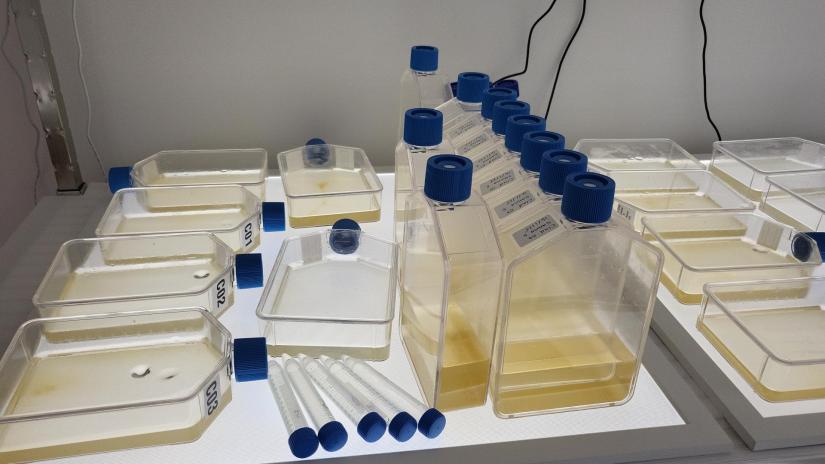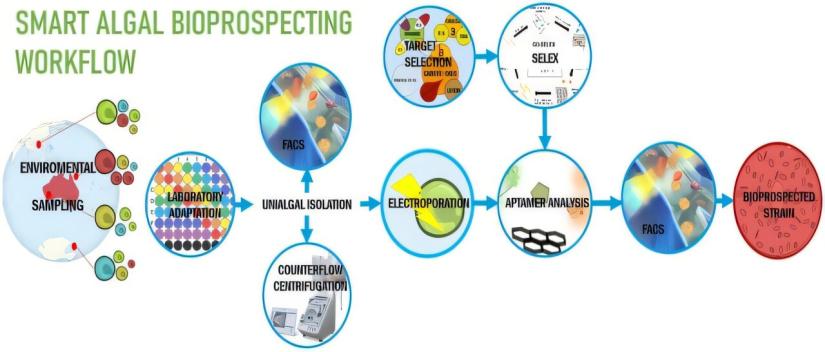As global efforts to combat climate change intensify, microalgae stand out as an underutilised yet promising resource.

A variety of microalgal cultures being grown in the lab. Photo: Joan Labara Tirado.
New research has highlighted microalgae’s capacity as a solution in the fight climate change, but researchers warn that “smart microalgal bioprospecting” is needed to unlock its full potential.
The study highlights the vast, largely unexplored capacity of microalgae to mitigate CO2 emissions while driving sustainable industry.
“Microalgae have remarkable properties that make them an ideal tool for tackling climate change,” said lead author, PhD candidate Joan Labara Tirado from the University of Technology Sydney (UTS).
The review paper, The need for smart microalgal bioprospecting was recently published in the journal Natural Products and Bioprospecting.
Beyond CO2 sequestration, microalgae offer significant promise as ‘cellular factories’ that can transform captured carbon into valuable products.
“Microalgae grow incredibly fast, absorb CO2 at a much higher rate than terrestrial plants, and don’t compete for arable land, making them a viable option for sustainable carbon capture and industrial applications.”
These include biofuels, pharmaceuticals, high-nutrient food sources, and even wastewater treatment, aligning with the principles of a circular economy. Successful examples include Spirulina which is widely used as a superfood or Dunaliella salina, a primary source of β-carotene for the cosmetics and food industries.

Credit: Natural Products and Bioprospecting (2025).
Despite their promise, the industrial use of microalgae remains in its infancy. “Right now, we’re only scratching the surface,” said Labara Tirado. Only a small fraction of the thousands of microalgae species have been studied, leaving many untapped opportunities for climate innovation.
“There are thousands of undiscovered microalgae species, each with potentially unique properties that could transform sectors like bioenergy, medicine or bioplastics.”
Bioprospecting – the systematic search for valuable biological resources – plays a crucial role in identifying and developing new microalgal strains for industrial and environmental applications.
This process involves discovering new species, analysing their biochemical properties, and assessing their potential to contribute to climate solutions.
While microalgae are often hailed for their carbon capture potential, one of the major hurdles in scaling up microalgae-based carbon sequestration is cost.
“These cost barriers have slowed widespread adoption, limiting the commercial viability of microalgae in carbon capture efforts,” said Labara Tirado.
The discovery of new microalgae species with enhanced growth rates, higher CO2 absorption efficiency, or lower resource demands could dramatically reduce these costs.
“By identifying and harnessing species that thrive in varied environmental conditions or require minimal inputs, researchers could pave the way for more economically viable carbon sequestration solutions,” said Labara Tirado.
“But to get there, we need greater investment in smart microalgal bioprospecting – using advanced technology and research methods to find and develop new strains for industrial and environmental applications.”
Labara Tirado isn’t just highlighting the challenges; his PhD is dedicated to pioneering new smart bioprospecting techniques aiming to accelerate the discovery of new microalgae species.
However, targeted funding, innovation and research initiatives are crucial to scaling microalgae-based solutions.
“The climate crisis demands unconventional solutions, and microalgae has the potential to play a major role in the transition to a greener future.”
“We need to act now through research, policy support, and industry partnerships to fully harness their potential.”

